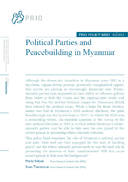Although the democratic transition in Myanmar since 2011 is a top-down, regime-driven process, previously marginalized opposition parties are playing an increasingly important role. Ethnic minority parties have improved on their ability to influence politics from below at both the Union and the regional/state levels, and Aung San Suu Kyi and her National League for Democracy (NLD) have entered the political scene. While a basis for these developments was laid in Myanmar’s 2010 national elections, the great breakthrough was the by-elections in 2012 – in which the NLD won a resounding victory. An essential question in the run-up to the next national elections in 2015 is to what extent Myanmar’s ethnicminority parties may be able to take over the role played by the armed groups in promoting ethnic-minority interests.
This policy brief examines the role of Myanmar’s political parties and asks: How well are they equipped for the task of building peace? Are the ethnic-minority parties ready to take the lead role in promoting the interests of their constituencies? Will this cause armed groups to fade into the background?









